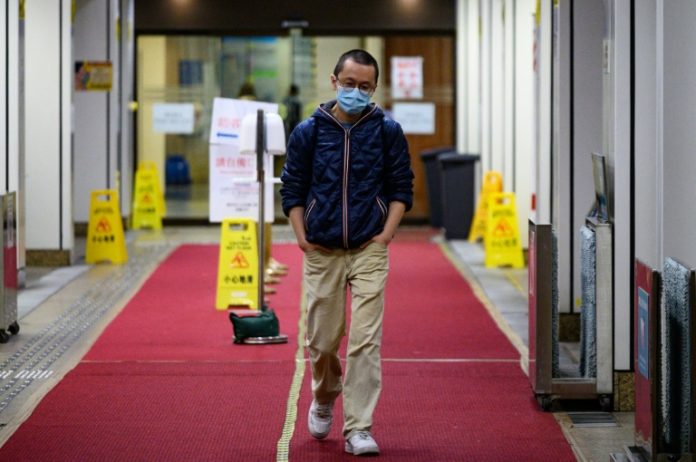After gruelling shifts treating coronavirus patients, Hong Kong doctor Alfred Wong often finds himself alone in a hotel room eating takeaway, battling the pain of being separated from his pregnant wife.
The 38-year-old volunteered to join staff on isolation wards – dubbed “the dirty team” – to avoid the risk of being called up later and missing his daughter’s birth in two months’ time.
While he is on the team, he has decided to keep contact with loved ones down to a minimum.
“All I can do now is to try my best to protect myself and stay away from everyone – my family and my friends,” he told media.
Since joining the team in early February, Wong has stayed at a hotel within walking distance of his hospital and shaved his hair into crew-cut, a way to reduce gaps in protective clothing.
Sometimes he picks up homemade box meals that his wife leaves on the doorstep of their home.
“The best gift I can give is perhaps a living husband,” Wong joked wryly, rubbing hands that had become itchy from being washed so regularly.
Wong and his wife are hoping to find a quiet restaurant and sit at different tables within eyesight of one another as their Valentines’ meal.
Hundreds of doctors and nurses like Wong are going through similar family separations as they battle a virus that has killed nearly 1,400 people in mainland China.
In Hong Kong, 53 people have so far been diagnosed, one of whom died.
While the numbers are low, the outbreak has still put a huge strain on the over-crowded hospitals in a densely packed city of seven million.
Around 60 percent of isolation wards in public hospitals are occupied with confirmed or suspected cases.
Wong and 14 fellow doctors currently have two confirmed cases on their ward but they are also monitoring 40 suspected cases. All must be treated as if they are carriers.
“We have to visit each patient twice a day and have three clinical meetings among our team to discuss the patients’ progress because this is a new virus,” he said.
A major source of mental pressure has been safety equipment like masks, face visors, gloves and gowns which are running low.
City authorities have admitted mask stocks for medical staff are only good for another month and they are seeking new imports – despite a global shortage.
But medical associations have warned those stocks could run out much sooner at the current rate of use.
Hong Kong’s pro-Beijing leaders have come under fire from within the medical sector over their inability to stockpile enough masks – and accusations they were slow to limit arrivals from the Chinese mainland.
Thousands of medics went on strike earlier this month calling for the border to be closed. Wong said he did not take part but supported the industrial action.
He said the government should have been better prepared given the current outbreak was “just history repeating itself”.
In 2003, 299 people were killed when a Severe Acute Respiratory Syndrome (SARS) outbreak swept through Hong Kong.
Eight medical staff died, including a young doctor at Wong’s hospital.
Wong, a medical student during SARS, said he didn’t yet know whether he would have any regrets about volunteering.
“Someone has to do the job and we are the people who have been trained to do the job,” he said.
















